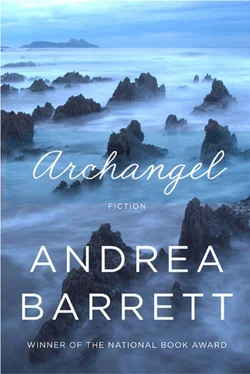“I may try to do a whole book,” Daphne said. “Once I dispose of Ezra.”
Ezra, Henrietta learned, was a young clergyman from Daphne’s hometown, a friend since childhood suddenly grown determined to marry her. Her parents, eager for grandchildren and worried about her age — she was already twenty-six — were pushing her to accept.
“You must have an Ezra, yourself,” Daphne added, as they sifted dirt in the potato field near the barn. “Several Ezras, perhaps.” Her gaze brushed over Henrietta’s face. “Waiting at home to tie you down … do you think of marrying?”
“I don’t,” Henrietta said. There were men she’d been drawn toward at Oswego, men even here she found attractive, but marriage — her mother, with all the miscarriages and stillbirths she’d suffered in the eleven years between Henrietta and Hester, had taught her more than she’d meant. “But what’s wrong with your Ezra?”
“Everything, really,” Daphne said scornfully. She turned over another clump of dirt. “His carefulness, his closed-mindedness. Even if I wanted to marry in the first place, why would I choose a clergyman as backward as the professor?”
“I don’t see how you can call the most famous naturalist in the country backward .”
“He is Mr. Darwin’s staunchest enemy,” Daphne said. “Which in my opinion makes his own work suspect. Ha!” She plucked out a handsome striped pupa. “Our friend the potato worm.”
“Is that its tail?” Henrietta asked. A long, thin tube curved from one end and bent back under the body like a handle.
“Tongue case,” Daphne said, sticking out her own pink tongue. “Once it hatches into a sphinx moth, it’ll have a tongue that unrolls to be five or six inches long. You must have seen the moths hanging in the air at dusk, lapping up nectar from flowers. Mr. Darwin would say the tongue is a marvelous adaptation, slightly different in each species, selected for over time in response to the shape of blossoms. Whereas our professor would have some rapturous phrase about the elegant contrivances of the Creator.”
The two men, Daphne continued, were philosophical opponents, glaring at each other across an unbridgeable divide. Everything the professor taught about the immutable nature of species, Mr. Darwin opposed. Which was the same, Henrietta realized with a shock, as saying that everything she’d been taught, both at her village school in Hammondsport and, later, at Oswego, was in Daphne’s opinion purely wrong.
“You,” she said, “you think, then …”
She stepped over the dusty leaves behind her, suddenly queasy from standing so long in the sun and afraid to finish her question. Surely potato worms were and always had been only, exactly, potato worms. Even when they became sphinx moths. Mumbling something about needing more drawing paper, she left Daphne in the field.
A few days later, though, despite Henrietta’s efforts to avoid it, Daphne picked up that discussion again. Another of the professor’s wealthy supporters had supplied simple microscopes for each laboratory pair and the professor had shown them how to fashion stands using blocks of wood, metal rods, corks and wire and bits of glass. “Useful,” Daphne said approvingly, as they chloroformed bumblebees and prepared to examine the parts. “We could make these inexpensively for our own classes.” This sort of practical laboratory skill made the course seem worthwhile; she did not respect the professor’s old-fashioned views and she might not, she confided, have signed up for the session had she not needed to see less of Ezra.
She held a dead bee’s head as she spoke, waiting for Henrietta to drip a bit of melted sealing wax onto a glass slide. When the wax began to cloud she pressed the head onto the glass and passed the slide back to Henrietta, who positioned it under the lens. Whether he was talking about echinoderms or fossil fish, Daphne continued more quietly, all the professor’s lectures circled back to the same essential argument, in her opinion theological rather than scientific.
Henrietta made a careful diagram of the cavity housing the mouth parts, moving the mandibles with a needle and spreading open the sucking apparatus. Instead of returning to the field, Daphne claimed, and gathering actual data, the professor had wasted the last decade opposing Mr. Darwin’s theories. He could say as many times as he liked — indeed, he said it here — that the simple structural plans uniting groups of species were actually ideas , Divine Conceptions, which existed independent of any material expression of them: but what had he ever found to prove that? At home, all the young teachers in her natural history study group were ardent Darwinians, as was she. The professor was nearly alone in his beliefs.
“I think you exaggerate,” Henrietta said. She moved the slide clumsily, smearing the wax: spoiled, now. How disturbing it was to hear this! She thought of her mother, back home in Hammonds-port, reading aloud to her from the professor’s books. “Perhaps not everyone agrees with him, but still …” Her teachers, two of whom had been his students, admired him enormously. Were they so behind the times?
Daphne fell silent but later, when they were out in the marsh, plucking periwinkles from the eelgrass, she started up again. “He’s a wonderful speaker,” she said. As persistent as a starfish prying at a clam. “He hypnotizes people. That doesn’t make him right.”
Henrietta held up a shell. “ I was taught that science depends on facts, not speculations,” she said firmly. “Observations, not wild flights of fancy. It’s a fact these are specimens of Littorina rudis , also that gasteropods have a radula covered with rows of chitonous teeth. This has a radula, as I do not; it rasps algae from these leaves, as I cannot; these are also facts. The stability of species is a fact. The fossil record, which in no place shows evidence of transitional forms, is another fact. My teachers who read Mr. Darwin’s book said it was riddled with fallacies and wild speculations. And that Mr. Darwin departed so far from Baconian methods that his work was not worth reading.”
Daphne poked at the tiny turbans in Henrietta’s palm. “Why,” she said, “don’t you just read the book for yourself?”
She loaned to Henrietta her own, much marked-up copy, which she’d brought to the island. Henrietta read it over the next week in secret, hoping to avoid upsetting either the professor or his wife, but it was so absorbing that she began skipping meals and lectures, which made her conspicuous in another way. Soon the professor, who when they first met had seemed so pleased with her, was frowning with disappointment. Twice the professor’s wife asked if she was unwell — and still, she kept reading. One sentence locked into the next and the next, the book itself quite different from the ideas as they’d been summarized by her teachers and then dismissed. A gigantic crowd of examples alternately crushed her and then swept her wonderfully, relentlessly along. From variation under domestication — pigeons, who had ever written so much about pigeons? — to the variations found in nature; from the great struggles for existence to the complex modes of finding a place in the natural economy; from natural selection and sexual selection to divergence of character and extinction: she was overwhelmed. Yet she was also troubled by how well the pieces seemed to fit together.
The tide went out as she read about an entangled bank, covered with many kinds of plants. Her legs went numb and the wind stirred up tiny spirals of sand; she missed an entire lecture about clams. The bank was colonized by singing birds and buzzing insects and burrowing worms, each different but all interdependent, produced by the laws Mr. Darwin had earlier described. She looked up and saw the bay gleaming before her. At school, Mr. Robbins had argued this: If species arise by transmutation, then why can we find nowhere in the geological record traces of the intermediate varieties connecting specific forms? We ought to see finely graduated chains; we see no such thing. Indeed we see the opposite: whole groups of allied species suddenly arising in specific formations. The professor had addressed this himself in a lecture about the teleostean fish. Once there were no such things as ray-finned bony fishes. And then there they were, a beautiful array of variations on a single new plan.
Читать дальше












